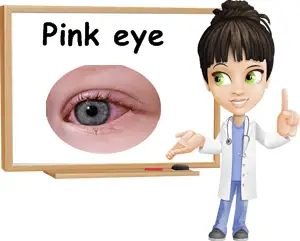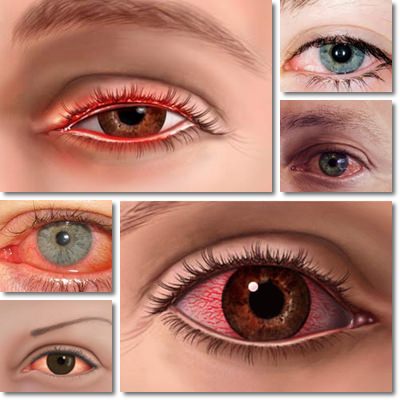Also known as pink eye, red eye or pinkeye, conjunctivitis refers to the inflammation of the transparent membrane that lines the white area of the eye and the inside of our eyelids, called the conjunctiva.
Conjunctivitis is a contagious condition caused by various bacteria or viruses, but also a result of an allergic reaction. Aside from other specific symptoms, the condition is often accompanied by redness and either a liquid or a mucous discharge.
If a healthy person comes into contact with this discharge, the odds they get conjunctivitis are high. Though contagious and quite unpleasant overall, conjunctivitis generally does not require medical treatment.
However, it might be possible for your doctor to prescribe you anti-inflammatory medication, antihistamines or topical antibiotics if the condition is severe.
There are, however, several ways to improve symptoms and promote faster healing.

So what is conjunctivitis of the eye?
As mentioned above, conjunctivitis is an inflammation of the conjunctiva, the transparent membrane covering the white part of the eye and lining the inside of our eyelids. It is also called pink eye because the inflammation causes the blood vessels in the conjunctiva (the same blood vessels we see in the white part of our eye especially when our eyes get tired) to dilate and become red or pinkish in color.
What causes conjunctivitis?
- The main causes of conjunctivitis are:
Viral infection - Bacterial infection
- Allergic reaction.
- Irritant substances in skin or hair products, cleaning products etc.
Conjunctivitis can occur in people of all ages and contracted fairly easily due to its high contagiousness.
Signs and symptoms of conjunctivitis
Although conjunctivitis does not affect vision, its symptoms may produce discomfort and distress and side effects that affect eyesight. The 8 common signs and symptoms of conjunctivitis are:
- A pinkness or redness of the white of the eye.
- Swollen and red or pink-red eyelids.
- Watery eyes or increased tears production.
- Itching and burning sensation (common in allergic conjunctivitis as well).
- Thick, mucous-like white or yellow discharge (usually occurs in bacterial conjunctivitis).
- Crusty eyelids.
- Rhinitis (irritated, stuffy, runny nose), commonly caused by allergies.
- Blurred vision.
- Light sensitivity.
One or both of the eyes may be affected by the infection. However, even if conjunctivitis is present in just one of the eyes, both are treated because there is a high risk the infection will spread to the other eye as well.

Types of conjunctivitis
Viral conjunctivitis
Viral conjunctivitis can be caused by a wide range of viruses that trigger respiratory tract infections such as the common cold or flu. Adenoviruses, Herpes simplex, the Varicella zoster virus can all cause viral conjunctivitis. Adenoviruses affect us in greater numbers during the spring and fall months. Viral conjunctivitis is thus accompanied by flu-like symptoms such as light sensitivity, swollen lymph nodes, sneezing, feelings of unwell etc.
No antibiotic treatment is recommended because the virus has to run its course. In the case of a Herpes infection causing conjunctivitis, which is a rare occurrence, your doctor might prescribe you antiviral medication. Generally, people with viral conjunctivitis are not exempt from work unless their infection is severe. The pinkeye should clear in about 1 week, although complete recovery of the eye may take about 2 weeks.
Bacterial conjunctivitis
Staphylococcus infections, Haemophilus influenzae type B, Chlamydia trachomatis, Moraxella, Streptococci, Neisseria gonorrhoeae, etc. can all cause bacterial conjunctivitis. Eyelids are tender and red, the white of the eye becomes pinkish or red, eyes are watery and irritated. Crusting may appear and you may wake up with sealed eyelashes in the morning. There may be a white, yellow or even greenish thick discharge in more severe cases. Some sufferers also report a feeling their eyes gritty, as if there was sand in them or a foreign object. Pain may appear in severe cases.
Bacterial infections are generally treated with antibiotics so your doctor might prescribe you antibiotic eye drops or a topical antibiotic ointment. If only one eye is infected, the infection is likely to spread to the other eye as well. Cat scratches to the eye are also probable causes of bacterial eye infections and conjunctivitis and affect humans and dogs frequently. They need to be dealt with immediately at the doctor’s.
Allergic conjunctivitis
This is a result of an allergic reaction to various allergens such as plant pollen, certain substances in perfumes, skin care or cleaning products (depends on each individual in particular). The white of the eye becomes irritated and pink, the eyes are itchy and watery. A case of allergic conjunctivitis is also accompanied by allergic rhinitis so you might also experience a runny, watery and itchy nose as well as sneezing. Symptoms may be stronger or more severe on windy days for some people because the wind raises the pollen in the air.
Once you are no longer exposed to the allergen (go inside the house, for example), symptoms should start to clear. In certain cases, your doctor might prescribe you antihistamines to help you better deal with allergies.
Conjunctivitis caused by irritant substances
Some people are more sensitive than others, especially to chemicals in skin and hair products, cleaning products, smoke, fumes etc. So for some of us, a certain brand of eye lotion, face cream, perfume or cleaning product can make our eyes red, itchy and watery. This irritation is a sort of conjunctivitis as well.
The irritation can be more or less severe depending on the person and their sensitivities, type of irritant, duration and type of exposure (e.g. the conjunctivitis can be caused airborne particles from perfume, pollutants, cleaning products or intentional or accidental exposure by means of topical use).
In the case of conjunctivitis caused by irritants, it is important to clean the face with plenty of water to remove irritants from the eyes and eye area as soon as possible – this essentially stops exposure and should help clear the irritation. Just as important, consult your doctor if needed for further advice on what to do.
What to do about conjunctivitis
If you suspect you have conjunctivitis, it is important to see your doctor for adequate diagnosis and advice. If your condition is severe, your doctor can prescribe you anti-inflammatory medication, a topical antibiotic (for bacterial conjunctivitis) or antihistamines (if you have allergic conjunctivitis).
If your condition is mild, there are a few tips and solutions to help ease your symptoms, hurry healing and make you more comfortable throughout the healing process.
- Stay in bed if you feel unwell, especially if it’s an infection.
- Avoid makeup until the condition has cleared and disinfect brushes, sponges, mascara wands etc. and makeup products you may have used when the symptoms debuted.
- Throw away contact lenses worn while sick and wear glasses instead for the whole recovery period.
- Clean face gently with water or cooled chamomile tea/infusions.
- Wash hands often and avoid touching your eyes or the discharge, if present.
- Do not share pillow cases, makeup products or tools, other face products, towels etc.
- Use non-prescription artificial tears to help relieve itching, but avoid using the same products for both the infected and uninfected eye if your conjunctivitis is restricted to just one of the eyes.
- Gently clean crusts with a cotton ball or cotton makeup remover pads soaked in warm water to help soften them up so as to not cause breaks in the skin or scratches.
- Clean the discharge with soft cotton balls or cotton makeup remover pads as often as needed, and remember to wash your hands before and after.
- Take your vitamin C and vitamin A for good immunity and good eye health.
Bell peppers, oranges, kiwifruit, carrots, blueberries, sweet potatoes and green leafy vegetables such as spinach are all great options. Some people use Eyewort (Euphrasia rostkoviana) compresses for the eyes for a faster healing.
How long does conjunctivitis last?
Conjunctivitis usually takes about 5-7 days to heal, but complete recovery may take up to two weeks. Almost 2/3 of cases do not require antibiotic or antiviral treatment.
Nevertheless, it is best to make an appointment with your doctor for diagnosis, and follow through with the treatment plan you are prescribed.
While adults can attend work, young children should be kept at home until their infection clears.
Complications may appear, but are usually very rare. Scarring of the eye, vision problems or secondary infections may occur in particularly severe cases, hence the importance of making an appointment with your doctor for a professional medical assessment and proper diagnosis and treatment. Whatever the cause of your conjunctivitis, know that good hygiene and a bit of patience can greatly improve symptoms severity and promote healing.
